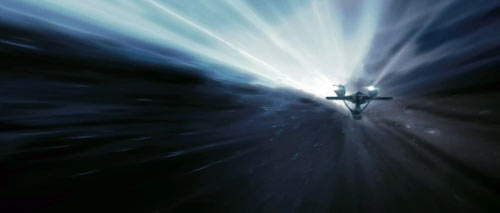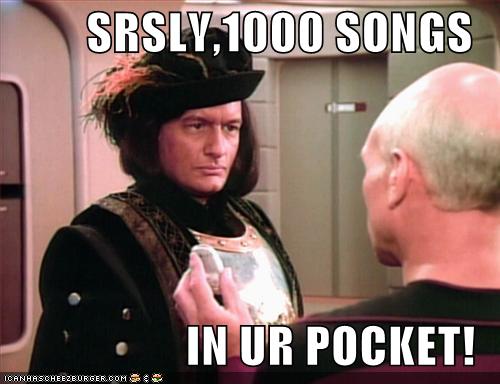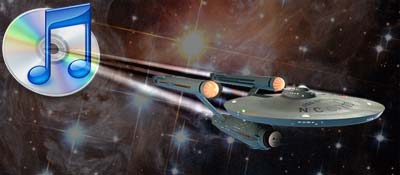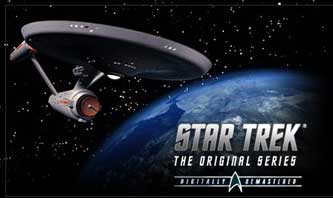The newest Star Trek movie is premised on the idea that a new, alternate timeline is created when Nero’s ship appears and destroys the USS Kelvin at the beginning of the film, killing Jim Kirk’s father and depriving the captain-to-be of the stable childhood he had in the original timeline. Everything before that point remains the same as the established canon; everything after then will develop differently. It’s a solid enough foundation with which to play with the original series’ characters without interfering with all the established stories of the past 40 years. But some extended thinking brings up several questions about and potential paradoxes within the events of this new alternate universe.
Please join me as I devote far too much mental energy to some of these issues.
The Permanency of the New Timeline
There’s nothing new to manipulations of time within Star Trek. Indeed, the first instance of time travel occurs in the sixth episode of the original series and the concept makes regular appearances in every iteration of the franchise. Heck, there are a couple episodes of Deep Space Nine that made time travel seem pretty much routine, so much so that Starfleet maintains a Temporal Investigations agency to police matters surrounding the Temporal Prime Directive. There’s one thing we’ve seen time and again in Trekdom: whenever alternate timelines are created, they are eventually erased and “the order of things” is returned to the way “they’ve always been.”
At the same time, there seems to be a distinct separation between the idea of a “universe” and a “timeline” within the franchise. Witness the “mirror universe” where Spock wears a goatee, Ben Sisko is a privateer and Jon Archer is presumably murdered by Hoshi. Events from the past in this universe have no effect on the future of the “normal” universe. Both story lines have independent origins and appear to run in parallel without intersecting with one another. This apparent separating between the container universe and its timeline would seem to suggest that within each distinct universe, the “branching” theory of time flow is not in effect. Infinite universes are not created with each passing second and with every decision made; instead there is but one definitive sequence of events.
Given this premise, the events of the 2009 Star Trek film definitely take place in the “normal” universe but within a new timeline that erases everything we know about the future, much like when Edith Keeler doesn’t die in the early 20th century or when the Enterprise-C isn’t destroyed defending Narendra III.
And speaking of “Yesterday’s Enterprise,” where’s Guinan in this new timeline? We know that she is a long-lived character, having traveled to Earth as early as the 1890s. If she was around then, she’s around in the new timeline. And from that episode we know that she can sense disruptions in the timeline. Does she think this alt-verse feels “wrong” the same way she felt the timeline was wrong in that episode? Guinan’s actions would seem to suggest that there is only one valid timeline for the “normal” Star Trek universe and that alternate timelines invariably work their way toward collapse, reset or at least “merging” with the Prime timeline so that altered events become incorporated into the normal timeline (see DS9’s “Trials and Tibblations”, TNG’s “Time’s Arrow” or VOY’s “Year of Hell”).
And therein lies the potential weakness of this new rebooted franchises universe. As with any other time travel story, there’s always a way to undo events and reset the timeline to its proper course. Indeed, what’s to stop additional time travel from preventing the Narada from destroying the Kelvin?
One could make the argument that in the Prime timeline, that’s exactly what happened. In the regular timeline we’ve always known, the Kelvin picked up some unusual sensor scans only to discover nothing of consequence, much like in “Yesterday’s Enterprise” where the Enterprise picks up some readings only to have those readings disappear. Thus, without having met Nero, the Kelvin carries on without incident, the Prime timeline continues normally and the alt-verse collapses without ever being formed.
Just how might that happen? Well, having met prime-Spock and the mindmeld, young alt-Kirk knows about the Prime timeline. Maybe he decides he’d rather have grown up knowing his father and devises a plan to prevent Nero from going back in time, thus restoring the original timeline. That’s just one speculation, but however events unfold, it is my belief that the new alt-verse is destined for erasure. So lets have some fun in it while we can.
::
Having said all that, one could also make the argument that the film does not actually take place in an alternate timeline, but has instead jumped to another mirror universe. We know it’s possible to jump between universes and simultaneously travel through time (as the Tholians did with the USS Defiant in Enterprise’s “In a Mirror Darkly”), so a similar thing could have happened here. The events of TNG’s “Parallels” lend support to this theory as well and Star Trek (2009) co-writer Roberto Orci cites that episode and the Many World’s aspect of quantum theory as rationale for the time travel story of the movie.
Still, if every timeline/universe is valid, how can any of them be “wrong” and need to be set “right”, as is the case in so many Star Trek stories?



